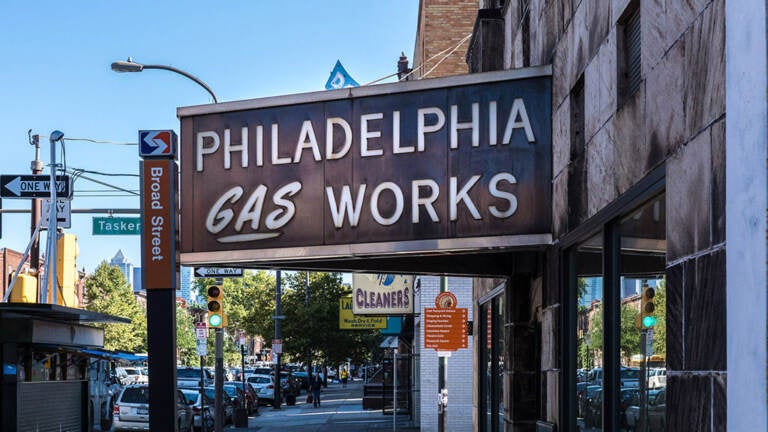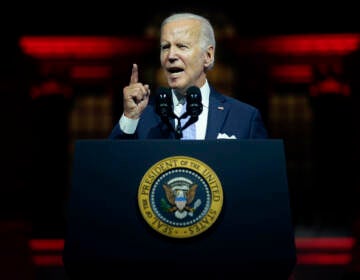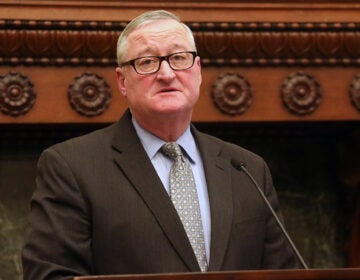A budget battle: Clean energy advocates say PGW is seeking to block transparency in budgetary proceedings
PGW has requested changes to public participation in budgetary processes calling them “overburdensome” and “inefficient.”

A Philadelphia Gas Works sign is pictured on South Broad Street. (Danya Henninger/Billy Penn)
Advocates working to transition the city-owned Philadelphia Gas Works away from fossil fuels and toward renewables say the utility is trying to make its budgetary process less transparent. The issue came up Friday at a City Council hearing, which was aimed at discussing how the utility could reduce its carbon footprint as outlined in PGW’s Business Diversification Study.
Testifying at a hearing of the Joint Finance and Transportation and Public Utilities Committee, Reverend Dwayne Royster of POWER Interfaith urged PGW to pursue networked geothermal as an alternative to providing natural gas as a heating source for customers. The technology taps water run through pipes deep underground where the temperature is a steady 55 degrees Fahrenheit, and employs water based heat pumps to heat and cool buildings.
Royster also called attention to the utility’s recent request of the Philadelphia Gas Commission to eliminate discovery and cross examination in its budget proceedings.
“Though PGW is a public company owned 100 percent by Philadelphia, and therefore owned by Philadelphians, managers fail to provide essential information and seek to exclude the public from participating in decisions,” said Royster. “These attempts by PGW to fight transparency and public participation are unacceptable.”
POWER has been pushing PGW and the City to address climate change. It wants to see a “just transition” for PGW, which would include maintaining good paying union jobs and affordable energy for low income residents. But the activists are frustrated by what they see as PGW dragging its feet over any move away from fossil fuel. Royster has referred to budgets as “moral documents” that should reflect the values espoused by agencies or government entities.
Philadelphia has a climate goal of carbon neutrality by 2050, but its ownership of a fossil fuel utility stands in its way. The Diversification Study was an attempt to grapple with that conundrum.
A battle over the budget process
The Philadelphia Gas Commission conducts PGW’s budget proceedings and approves both its capital and operating budgets. City Council grants final approval on the basis of the Commission’s recommendation. The process currently allows groups representing rate payers to ask for and receive detailed information and documentation about the requests. Those groups also cross-examine PGW officials.
PGW has proposed that groups like POWER could instead submit written questions ahead of time to the Gas Commission’s hearing examiner, who would then make a decision as to what questions would be answered by PGW officials.
In a response to a January request by PGW to eliminate both discovery and cross-examination during capital budget proceedings, the Public Advocate, which represents ratepayers, said those changes were unreasonable and would prevent it from “fully and fairly” representing the interests of PGW customers. Community Legal Services has a contract to act as the Public Advocate with regard to PGW’s budget.
The Gas Commission rejected the bulk of PGW’s request to change the capital budget process. But this week, PGW’s attorney Andre Dasent once again made a similar request regarding the operating budget. In a letter, Dasent told the Gas Commission the process has “no legal mandate” and does not help the Commission review and make decisions on the budget. Dasent wants the Commission to give the Public Advocate authority to coordinate any questions stemming from other groups or individuals seeking to intervene in the case.
A spokesman for PGW said the utility does support transparency. “Its recent recommendation to the Philadelphia Gas Commission seeks only to reduce regulatory duplication, as PGW currently responds to multiple regulators offering the same information,” said PGW’s Richard Barnes in an email. “PGW will continue to provide the same level of transparency and access to public information as it always has.”
POWER’s Rev. Royster says much is at stake with the climate crisis, and solutions can only come from a vigorous public process. Electrification of heating and cooling is seen as essential to reduce carbon emissions.
Referencing Martin Luther King Jr., Royster told Council members that the moment was “critical.”
“In key speeches in the 1960’s, Dr. King constantly invoked the theme of the fierce urgency of now,” Royster said. “That phrase applies here in 2022. The climate crisis is intensifying and those who have the least wealth and power are harmed the most.”
His group sought to have $500,000 allocated in PGW’s capital budget for a pilot project exploring networked geothermal. While the Gas Commission rejected that request for the capital budget, the Commission recommended $500,000 in PGW’s operating budget for all three pilots outlined in the Business Diversification Study.
POWER, along with the Public Advocate, oppose one proposal that would lend ratepayers money for weatherization. They say more funds should be allocated to expand free weatherization programs instead. The other proposal, exploring “renewable natural gas,” is rejected by most advocates as both expensive and carbon intensive.
WHYY is your source for fact-based, in-depth journalism and information. As a nonprofit organization, we rely on financial support from readers like you. Please give today.





